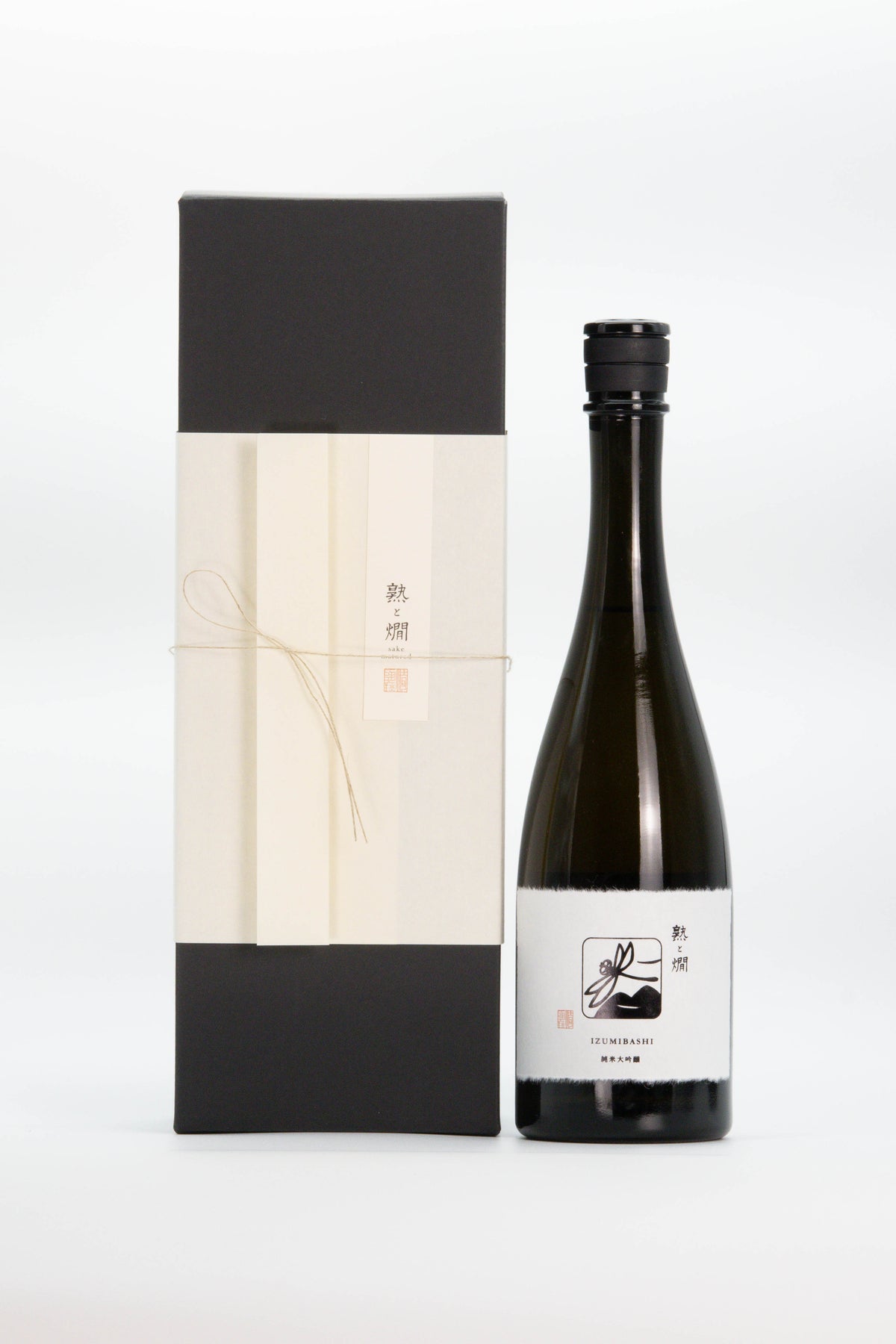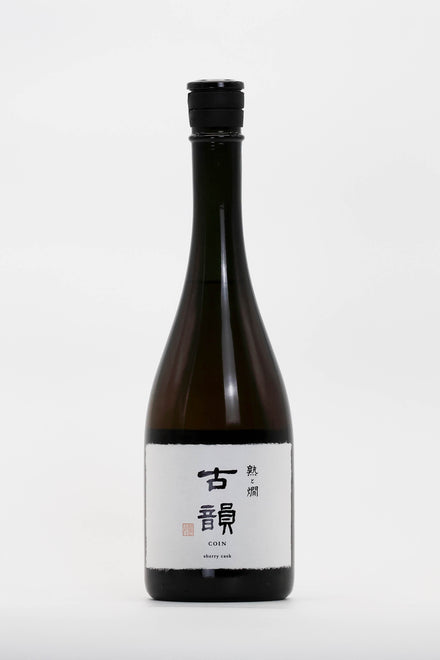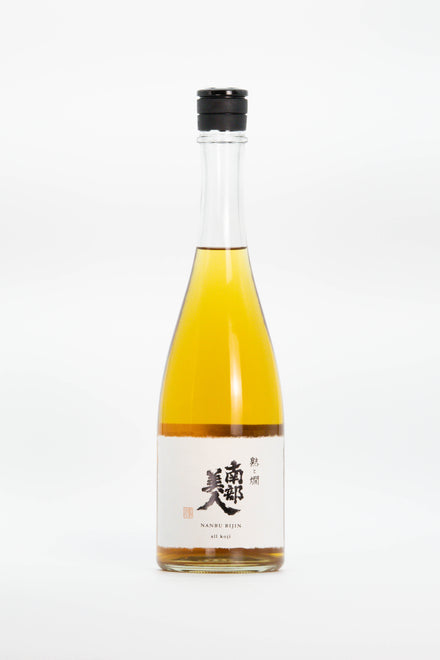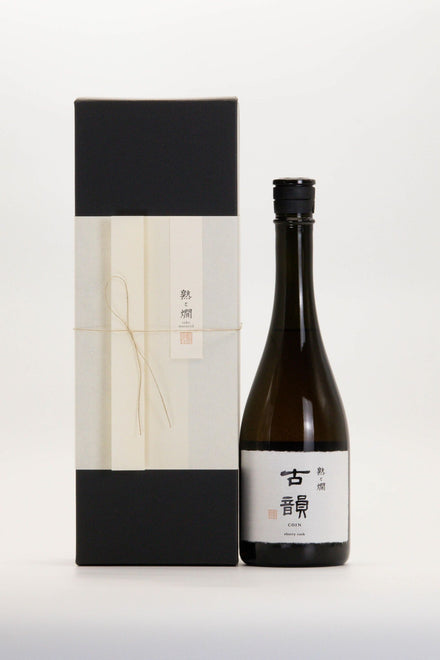

This 2006 vintage Junmai Daiginjo, brewed entirely from locally grown rice, is a well-balanced aged sake with a mellow sweetness and umami flavor that has been softened through aging.
[Gift] Izumibashi Junmai Daiginjo 2006
| Vintage | 2006 |
| Years aged | 18 years |
- 10 years or more
- 10,000 – 49,999yen
- 2000-2009
- All Products
- Gift suggestions
- Golden yellow
- With dessert and/or as an after-dinner drink
- 熟と燗オリジナル
- Brewer:Izumibashi Sake Brewery
- Alcohol:16%
- Volume:720ml
Couldn't load pickup availability
[ Drinking alcohol under the age of 20 is prohibited by law. ]
In pursuit of the belief that "sake brewing starts with growing rice," Izumibashi Sake Brewery is a "cultivation and brewing brewery" that practices everything from growing rice with contracted farmers in the local Kanagawa prefecture, to polishing and brewing, and this aged sake was brewed in 2006 and carefully selected by Juku to Kan from the brewery's matured sake library. Ebina City, Kanagawa Prefecture, is known for its hard water, but by aging the sake at room temperature in the brewery, the hardness is softened, allowing you to enjoy the inherent sweetness and umami. Aging also balances the astringency and bitterness, resulting in a well-balanced taste.
- about
-
Type Junmai Daiginjo Rice polishing ratio 50% Yeast type Association No. 901 Ingredients/raw materials Rice (domestic), rice malt (domestic) Rice type 100% Yamadanishiki Origin of rice Ebina City, Kanagawa Prefecture Toji(Brew Master) ー Assemblage 無
- Recommended occasions/temperature
-
- How to store
-
- Delivery dates and charges
-
![[Gift] Izumibashi Junmai Daiginjo 2006](http://sakematured.com/cdn/shop/files/izumibashigift.jpg?v=1743739610&width=1445)
![[Gift] Izumibashi Junmai Daiginjo 2006](http://sakematured.com/cdn/shop/files/glass_3_2_4ac5fa27-0e6f-4976-8e5d-86279af0e22f.png?v=1756100552&width=1445)
Tasting comments
-
Hidekazu Ishiwata
(Former National Tax Bureau Chief Appraiser)The top notes are sweet cacao with a slight acidic accent. The aftertaste is well-balanced and clear.
The taste is elegant and gentle.
It has a quiet impact, but it's a drink that makes you want to sit in silence and enjoy it. -
Akiko Toda
(Director of ITTEKI, Japan Sake and Meat Research Institute)The aroma is reminiscent of popcorn, with purple and green nuances reminiscent of ginger and grass. This balance is interesting and deep.
Although the flavor doesn't have a strong attack, the umami flavor lingers on your tongue.
It's not particularly impressive, but it's an interesting drink that you want to know more about.
-
Yuji Yamauchi
(Yushima Tenjinshita Sushi Hatsu 4th generation / 1st JSA SAKE DIPLOMA competition winner)The aroma of the shrimp soup stock is strong and assertive despite the mild coloring.
My mind goes to shrimp crackers and I find myself wanting to bite into the sake.
I want to slowly savor the kombu-like umami in my mouth for a long time, perhaps with some fried kombu on the side.
Brewer


Izumibashi Sake Brewery
Founded in 1857, the brewery is located in Ebina City, Kanagawa Prefecture, and has returned to the ancient tradition of sake brewing, which begins with rice cultivation in the fertile grain-producing region known as "Ebina Farmland," and produces only Junmai sake (including Junmai Ginjo and Junmai Daiginjo). Ebina City, Kanagawa Prefecture, is located in the center of Kanagawa Prefecture, on an alluvial plain with abundant water from three rivers. Since ancient times, it has been known as "Ebina Farmland" and is one of the prefecture's leading grain-producing areas with a history of over 2,000 years. Based on the belief that "sake brewing starts with rice cultivation," this is a "cultivation brewery" that practices the entire process, from rice cultivation, including with contracted farmers in the local Kanagawa prefecture, to rice milling and brewing. We sincerely consider the differences in rice depending on the variety, place of origin, producer, and the climate of the year, and are constantly searching for ways to bring out the best in its characteristics. We believe that fermented foods have a special flavor that can only be achieved through aging over time. Since shifting to pure rice sake, we have become even more fascinated by the changes in aroma and flavor that occur with aging, and have been storing small amounts in bottles.



